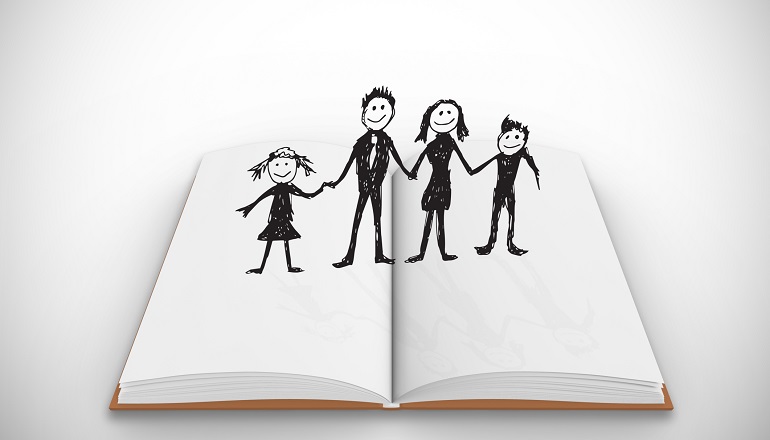Meredith
My experience is that families are families, period. It doesn’t matter if the people in the family share DNA. It doesn’t matter if kids have come from their mother’s bodies or not. Kids are kids, and parents are parents. That is the bottom line, as far as I am concerned. In fact, in all of my years of interacting with various friends, co-workers, and acquaintances, I’ve had a hard time finding many people who had a relationship with their moms even half as close as the one I’ve had with mine. We finish each other’s sentences, know exactly what the other one is thinking, and spent life as close to best friends as we could possibly have been.
Don’t get me wrong—we had our ups and downs, just like any other parent-child relationship. We had our share of yelling matches, and I’m pretty sure she wanted to bean me throughout my whole thirteenth year of life. But it’s so funny…we share so many traits that most of the time I feel as though I am, basically, a younger version of her. Because of that, I am a very strong proponent of nurture over nature when it comes to familial relationships. That’s not to say that both aren’t involved, because I am well aware that they are. However, in addition to having experienced life the way I did growing up, I also have the unique perspective of being a stepparent, so I get a front-row seat at the biological parent-child relationship show every day of my life, without actually being in it. I can tell you that based on my observations, nature does not always outweigh nurture.
Jennifer
My relationship with my family is very special. My mom, Janet, was my best friend in the whole world, and the most wonderful mom I could have ever hoped for. When she passed away, from cancer, I was 21, and I have missed her every single day since. I feel very lucky to have such a wonderful mom, dad, brother, and stepmom. They are the only family I know. I also feel very lucky to have had the wonderful birth family that found my adoptive family for me.
Adoption is very special. It’s not about us. It’s about what we bring to the world, how we help one another.
Anonymous
The discrepancy between my appearance and the ethnicity of my surname has inspired comments my whole life. Occasionally a stranger or acquaintance would comment on my being the only member of our family with blue eyes. I think my parents set an excellent example of flexible responses. To total strangers who exclaimed, “Where did you get those eyes?” my mother might laugh and say, “Recessive gene.” She would later wink at me and point out it was the truth. But people who knew my parents for any length of time also knew we were adopted, and their questions were answered differently, with something such as, “We know her background is Irish, so the eyes probably come from that.” I learned only as an adult that they worried about stigmatizing me by being so open about our adoptions. At the time, what I noticed was that they never acted as though adoption were something to keep a secret.
As time went on, I took a more active role in answering those questions, depending on my mood. My mother still laughs about the time after church, when someone commented on my last name not matching my looks, and I replied simply, “Well, I’m not related to my father.”
Nosy questions are a fact of life, and most of the adoptees I know become adept at deciding, on the spot, how much or little information to share. I don’t think it’s necessary to bring up adoption to just anyone who asks, but by modeling responses that are appropriate in different situations, you can set the stage for the day when your child can answer the questions himself.
Jane
As a black child living in a mainly white town, I felt alienated from African-American culture. My mother bought me black dolls, showed me movies about the Underground Railroad, and taught me about civil rights heroes. Instead of embracing these symbols of my culture, I shunned them. Yet, even though black culture seemed somewhere far away, I harbored a tiny connection to it. A second-grade project required that we do a paper on an important person in history. Immediately, I felt an obligation to do my paper on an African American. I chose Harriet Tubman.
My mother was the one who encouraged me to connect with other African Americans. Even though Mom is white, she has been the one to teach me racial pride. The most important thing she did was to drag my siblings and me to another town to attend a black church. The church was located in a small apartment complex, next to a McDonalds. I was afraid of it, and I thought it smelled strange.
My desire to be white, like everyone else, began to fade as I entered my later teenage years. In junior high, I still wanted to be in the majority, not the minority. I felt that I had nothing in common with anyone black, because I did not know many black people. I finally began to come to terms with myself as I moved through the preteen and teen-idol years. Something inside me changed. I saw black faces on television and began to feel a connection with them. With the rise of hip-hop and black artists in the music industry, I felt pride in my heritage for the first time.
The part of me that felt isolated from my race has not disappeared. I often feel caught between two worlds as I ask myself: Where do I belong? I look in the mirror and see a black girl with nappy hair and light-brown skin. On the inside, I am a girl who has always been at home in this mainly white town. I look forward to walking out into a diverse, multi-cultural world.
Hollee
It took four years of exploring my American, Korean, and adoption identities before I embarked on a journey back to my birth country to meet my birth father and his family. The night before I left for Korea, I sat with my parents on our back patio. I feared the only parents I knew might feel I did not love them if I met my birth family. But my dad dispelled my worries. He said, “We always knew we had family in Korea.”
During the trip, two days before I was going to meet my birth father, the director of my orphanage surprised me with a phone call. “Hwa Yong-ah,” he said, using my Korean name. “I decided to look for your umma—your mom—and I found her. You want to meet her too?” I had four years to prepare myself to meet my birth father, but I never thought I would ever be able to meet my birth mother.
Two brief days rushed by as I met not only my birth father, but my birth mother, half-siblings, grandparents, and cousins. I thought I was prepared for the reunions, but the experience was filled with surprises.
Years later, I was able to meet the priest who started my orphanage, a man who really understood the human heart. He said he had always expected that the children he helped to place overseas would come back to Korea. Old practices of secrecy have set the expectation—for some, a reassurance—that internationally adopted people will never encounter those connected to them by blood. But human nature does not always obey laws or follow the perceived “best practices.”
Eight years later, it seems the journey has only begun, and I’m not sure how the story will continue to unfold. I continue to travel to Korea, exchange e-mail with my half-siblings, and attempt to learn the Korean language. But meeting my biological family has in many ways strengthened my relationship with my adoptive family. I have a future now with my birth family, but nothing can take away the years of nurture my parents gave me. Meeting my birth family answered some questions I had while growing up, but it also raised new questions that I may never be able to answer.
Sharon
When my husband and I adopted twins, I wasn’t worried about forming a bond, because I was adopted as a child, too. My children know that they are adopted and that it is a special relationship, not to be ashamed of, but to be celebrated. The key to a good relationship is making sure your children know that they are secure and loved. Spend quality time with your children, and tell them that you love them often. I know that is all I ever wanted from my parents.
Brenda
My daughters and I have something important in common: We share the experience of joining a family through adoption. When I was adopted, in 1956, the topic was not openly discussed. People were just beginning to recognize the importance of birth parents and genetic connections, and, while my parents referred frequently to my adoption, I sensed their discomfort with the subject. As I became a teenager, my curiosity about my birth parents increased. Physical similarities that my friends shared with their parents, which most took for granted, fascinated me.
Over time, my curiosity became a powerful yearning to know about my genetic heritage. Growing up with so many unanswered questions, I never expected to become an adoptive parent myself. In fact, when I had difficulty getting pregnant, in my mid-thirties, I was adamantly opposed to adoption. I wanted to have the kind of genetic ties that I had envied in my friends’ families while I was growing up. And I didn’t want my child to feel the ache that had taken me more than 20 years to resolve.
Over time, my mind started to open to the idea. I knew that family ties forged by adoption were as true and deep as those made by biology. Love was not the issue. In the end, I had to relinquish my hoped-for biological connection to my children. I learned that that hope was a minor part of my desire to be a parent. When my first daughter, then five months old, was placed in my arms for the first time, I loved her instantly and completely. Over the years that followed, I’ve come to see how fortunate it is that my daughters and I share the adoption experience.
Most importantly, just the fact that we have this common experience makes my children feel good. I recently asked my daughters how they felt about my being adopted, too. “Happy,” my eight-year-old said immediately. My 10-year-old thought for a moment and then said, “Connected.”
Melanie
For many who are adopted, the hopes of having a child biologically helps fill the gap of some unanswered questions of the past. For me, having a child biologically was another loss I had to grieve before I could get on that plane to bring home my son.
I couldn’t believe how beautiful he was. I was in complete awe of him. When we took him home forever, my husband and I could not contain our emotions any further. We held our son—our son!—and each other, and cried. But this time, these were not tears from grieving—these were tears of utter joy. It didn’t matter how we became a family, only the fact that we were a family. I thought of my own Mom and Dad and what it was like for them, the first time they held me. With my son asleep in my arms, while I walked the streets that I proudly call my motherland, I realized I had come full circle—from a Korean adoptee to an adoptive parent.
I know that my son will grieve his past in his own way, but knowing we share that bond of adoption will, I hope, make grieving those losses a bit easier. There were times in my past when I wondered why I was adopted, and why God had chosen this path for me. Watching my son while he slept close to my heart, I knew—this was the plan God had in store for me when I boarded that first airplane all those years ago.
Meredith
I guess that the true testament to how great I think adoption, is when it comes to ways to build families, is the fact that I’ve always planned to adopt a child. I think it’s so great, in fact, that it’s the ONLY method of family-making I ever planned to pursue. I never wanted to be pregnant. That always seems to shock people, but, to me, it’s always been a question not of “why adopt?, but rather, “why not adopt?” The truth is that there are kids already in this crowded world who need families, and there are families who want kids, so it sounds like a perfect match to me. I’ve had this plan since elementary school, and, over the years, I told each and every guy I dated, as a young adult and beyond, needing them to know up front what they’d be getting into should our relationship develop further.
Last year, I finally got to realize my dream. Our daughter came home from Guatemala in February. When I was taking my leave of absence from my job, I was calling it just that, a “leave of absence.” For some reason, I had in my head that the phrase, “maternity leave,” referred only to those taking a leave for pregnancy. Then one day I thought, “Wait a minute, who says that maternity only refers to pregnancy? Doesn’t the word just refer to something relating to being a mother?” So the week before I left, I picked up the dictionary as I was typing up my Out of Office automated e-mail message. Here is what I found listed as the very first definition under “maternity”: “1. the state of being a mother; motherhood.” A-ha, I thought! So I hit that backspace key and replaced the words to read: “I am on Maternity Leave.” That’s better.
Abigail
Children need homes, and parents need children to create a family. Mothers teach how to fold towels, grandma’s recipes, to play fair, and introduce us to literary classics. Dads teach how to drive, to handle conflict, favorite ball teams, and the best political party. I’ll sleep in your arms, play peek-a-boo, bring “I love you” drawings to put on the refrigerator, alarm you with my adolescent fashion sense, and ask for the car keys. Families never stop growing and learning from each other. Understanding teaches courage; courage teaches stability; stability teaches trust; trust teaches acceptance; acceptance teaches love; and love makes the human heart elastic enough to make adoption less of a commodity transaction and more of an extension of family. That is an adoptee’s advice about good adoptive parenting.
Kahleah (age 9)
I was born in Guatemala and now live in Quebec, Canada. I would like to share my thoughts about family AND adoption. There are two ways of building a family, by giving birth to a child or by adopting a child. Some people do both! Some people cannot give birth, so adoption helps them to have a child, a child of their very own. Adoption also gives a child a forever family. It is not just children who are adopted. My parents are adopted, too.
Being a member of an adoptive family means having two families. One birth family and one forever family. Both families are important in different ways. Some people ask me if Mommy and Daddy are my REAL parents, and if Tristan is my REAL brother. I answer, “You can’t get more REAL than my family!”
I think adoption is a great way to build a family and to make people happy. To me, a family is: people who love each other, take care of each other, help and teach each other, and will always be together.
Justin
I was adopted at age two-and-a-half, from Korea. Quite simply, I have never been aware of any longing to find my birth mother. Nor am I aware of any indelible feeling of loss and sadness associated with not knowing her or her life story. I have heard stories about others who have been driven to find and meet their birth mothers, and, while these stories are often poignant and touching, they don’t stir any similar drive in my soul.
Susan
I was adopted as an infant almost 35 years ago, and I don’t remember having sad feelings about it. I was always proud of being so wanted by my parents. I believed what the adoption paperwork said—that my birth parents were young and not married, and wanted me to be raised by parents who could give me everything that they could not. It all made sense to me. I didn’t feel any sort of loss because I didn’t grow in my mom’s tummy.
As a teenager, I thought a little more about it. I had no less pride in my adoption than before, but I was also very interested in the births of my friends, because I felt like I didn’t really have one. I knew I had been born, of course, but no one could tell me about that day. Sometimes it seemed strange to me that people celebrated my birthday, when nobody celebrating with me had actually known me on that day. However, I loved my birthday, and knew in my heart that my birth mom was thinking of me as I celebrated with my family and friends.
As I approached adulthood, I would write about adoption. I began to wonder about my birth mom more and more, especially as I reached the age she had been when I was born. My writings had a melancholy tone, but not for me. I was sad for her, because I was starting to understand how difficult her decision must have been.
I remember when I gave birth to my daughter. After 12 hours of labor, I held her in my arms. I looked at her and my husband and remarked that I couldn’t believe someone had done that for me and then loved me enough to let me go. In my eyes, my birth mom was a hero for thinking of me first and herself second. It must have been so hard, because there was no way that anyone was taking my baby out of my arms. What a strong young woman she was, to do that for me.
Today, as I write this, I wait for my son to wake, which he does often during the night. His birth mom is half a world away, in South Korea, and she is another hero in my eyes. Without her, this incredible baby boy, who brings so much joy into my life, would not be sleeping across the hall, would not wake to snuggle in my arms, and would not grow up calling me “Mommy.”
Just as I felt sadness for my own birth mother, I feel sadness for his, because she is not knowing this incredible boy to whom she gave birth. My hope for her is that she can find peace in her decision, and can know in her heart that our son is being loved and is being taught that her actions were heroic.
Phil
I grew up in a family of seven children. While I’m not the youngest, I was the last to arrive to what was an adoptive family with two children from Korea; one Caucasian (my brother, who had been left on the stoop of a local church); myself, a biracial African-American; and three children born to my Norwegian parents.
The one thing I would say to parents adopting children of another race is: “Be not afraid!” Go outside your comfort zone to embrace your child’s culture of origin. Attend services at faith institutions in communities where your child’s culture of origin is dominant. Patronize the local businesses in those neighborhoods, and make acquaintances. Those allies can be useful later, as they might be willing to act as mentors to your child, should that be necessary. Recognize that there will be things—culturally speaking—that you cannot give to your child. It’s good to have others in your life whom you can rely on for that. I would also suggest that you move to such neighborhoods, if possible, or consider placing your child of color in a diverse school environment, if nothing else.
Do this, not only for your child’s sake, but for yours as well. It can be a life-enriching experience beyond your imagination, but it requires a commitment that will sometimes be uncomfortable. Ultimately, though, it will make you the truly multiracial family that you have become, and give your child a fighting chance at having a positive self-image in a world that doesn’t necessarily promote it.
Kaitlyn
My brother, Jason, and I were both adopted. Jason was born in Michigan, and I was born in Korea. Together with my parents, we made a family. We lived in a large city, and through my parents’ adoption agency, they were able to locate other parents who had adopted from Korea. When I was young, my mom made a real effort to get together with two of these families for dinners and picnics. It was probably good for me that we did this, but I still chose a Caucasian as a best girlfriend, not because she was white, but because she could ride no-handed on her bicycle and because we were experts at getting into trouble together in Ms. Lytel’s third-grade class. It wasn’t until I was in my teens that I really started to realize that I came from another country and another culture, that, given different circumstances, my life would be completely and totally different.
My teen years were definitely the hardest, for me and for my family. I felt different for the first time. I felt unsure about who I was and had a hard time resolving that. At first, I denied my heritage. I wanted to be like everyone else. Fortunately for me, I have the most wonderful parents in the world! They stood by me and, when I finally was ready to explore my feelings and needs, they were there to guide and share with me.
From one extreme, I went to the other, and immersed myself in learning about my Korean heritage and the history of my birth country. Slowly I moved toward the middle ground, and am now at peace with who I am. I want to say, however, that having a supportive and loving family was key in reaching the place where I now am. I don’t think that this crisis of self was totally based on being adopted or being Korean. I believe that all people have things that they must deal, with and times in their lives when they must resolve them. Those of us who are very, very fortunate have the love of family.
If I am asked one question more than any other, it is, “Do you ever want to go and find your real mother?” I understand why people ask this, but it is a pretty insulting question. I have a real mother. And in regard to finding my birth mother, I just don’t have that burning desire. If I could be granted one wish, however, it would be for my birth mother to know that she made the right choice.
My parents told me that they didn’t like it when people used to say, “Oh, she is so lucky to be adopted by you.” Just between you and me, I want you to know that they are right. I feel pretty lucky. I am loved.



